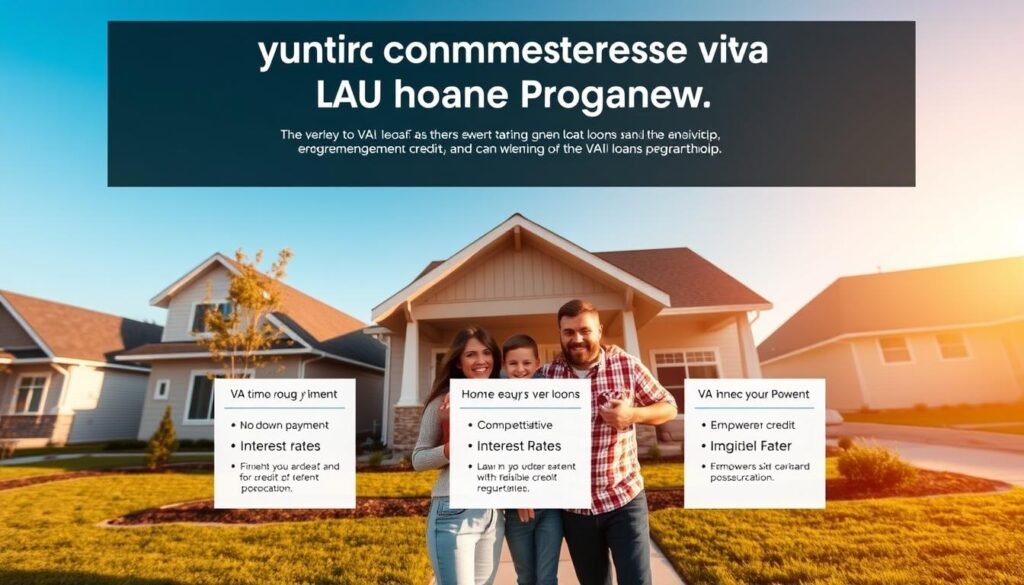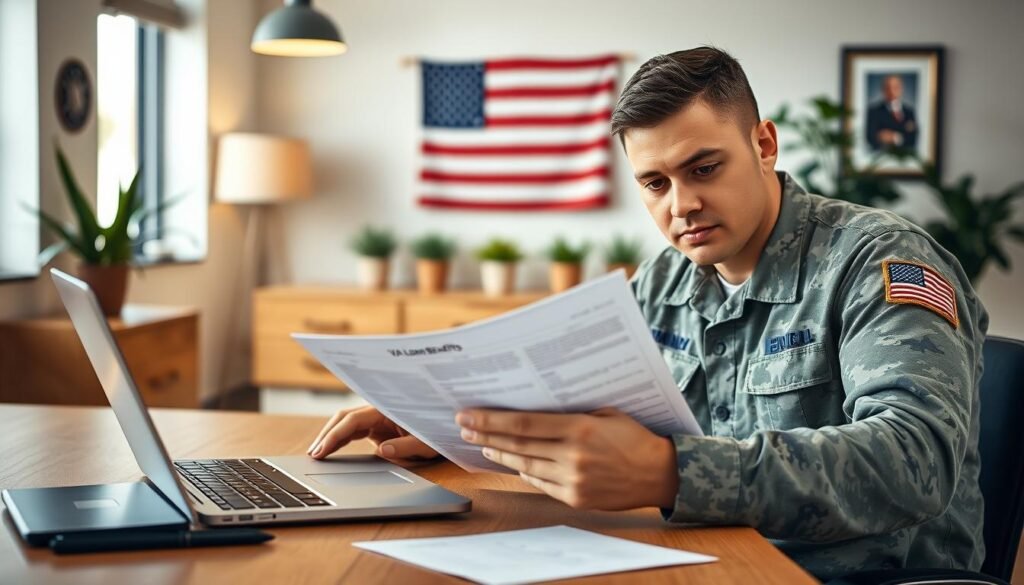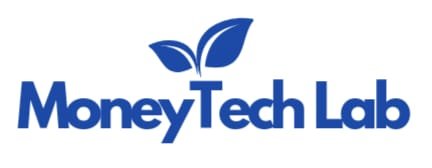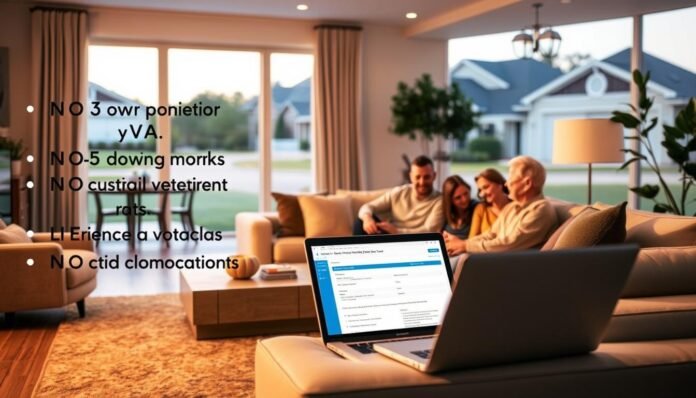Our nation’s heroes aspire to achieve homeownership through the American dream but how can they obtain it? The VA home loan program exists as a specialized financial instrument which helps veterans together with active-duty personnel and their bereaved spouses become homeowners. Special government-backed mortgage features enable veterans to obtain homes at better conditions than typical mortgage products assisting qualifying military persons with their dream of homeownership.
The VA loan program stands as a testament to our commitment to veteran housing assistance. The loan system helps service members buy homes by eliminating down payments and offering competitive rate terms alongside no private mortgage insurance obligations. The VA home loan surpasses financial product status because it creates an opportunity to express gratitude toward military members through housing benefits.
Prospective users of this special benefit must know both the basic features of VA home loans and their eligibility qualifications and available advantages alongside the defined restrictions. Whether you’re a first-time homebuyer or looking to refinance, the VA loan program offers options tailored to meet the unique needs of the military community.
Key Takeaways
- VA home loans are government-backed mortgages for eligible veterans and service members
- No down payment is required for most VA loans
- VA loans often offer lower interest rates compared to conventional mortgages
- Private mortgage insurance is not required with VA loans
- The program includes purchase, refinance, and renovation loan options
- Eligibility is based on service requirements and discharge conditions
- VA loans can be used multiple times throughout a veteran’s lifetime
Understanding VA Home Loans – Overview and Basics
VA home loans are a key part of the VA loan program. The loan program gives unique assistance features to active and retired military members and qualified spouses who survive their partners. Military service members obtain home loans through this program which features worthwhile loan terms.

What is a VA-backed home loan?
A VA-backed home loan is a mortgage from private lenders, but the VA guarantees part of it. A resulting effect of this backing is that lenders choose to provide improved mortgage conditions. The conditions of VA home loans include zero down payment requirements together with decreased interest rates alongside no need for private mortgage insurance.
Differences from conventional mortgages
VA loans operate on different terms compared to regular mortgages. Homebuyers do not need to make a down payment when they use VA home loans. The benefits of VA-backed home loans consist of both reduced interest rates and absence of private mortgage insurance charges. Because of this guarantee the monthly payments that borrowers must pay become more affordable.
| Feature | VA Loan | Conventional Mortgage |
|---|---|---|
| Down Payment | Not required | Usually 3-20% |
| PMI | Not required | Required if down payment < 20% |
| Interest Rates | Generally lower | Varies based on credit score |
Role of the Department of Veterans Affairs
The Department of Veterans Affairs is key in the VA loan program. The organization creates guidelines for borrowers who wish to get loans while defining home evaluation methods and establishing the guarantee system. This insurance enables lenders to provide superior loan conditions to their clients. Through VA loans service members can achieve homeownership more easily.
Key VA Loan Benefits for Service Members
The VA loan structure provides unique advantages to military personnel. The special benefits attached to VA loans simplify the house buying process while reducing purchase costs. The exclusive advantages offered by VA loans specifically support those individuals who formerly served in the United States military.
No Down Payment Required
VA loan borrowers receive a crucial advantage because they do not need to make any down payment. Veterans do not need to spend significant amounts of cash initially to purchase homes through these loans. The option enables numerous individuals to obtain homeownership.
Competitive Interest Rates
VA mortgage rates are often lower than regular loans. Service members benefit from reduced spending costs throughout the life of their home finance. Service members together with their families find homeownership to be more financially attainable because of these benefits.

No Private Mortgage Insurance
Homebuyers who take VA home loans do not require private mortgage insurance (PMI). This means lower monthly payments. VA loans provide substantial savings of thousands of dollars to borrowers throughout the duration of the loan.
Limited Closing Costs
The VA home loan safeguards borrowers from expensive closing fees. The Department of Veterans Affairs sets proper limits on what fees borrowers can pay. Eligible service members find VA loans to be an excellent financial option because of their benefits.
| VA Loan Feature | Benefit to Service Members |
|---|---|
| No Down Payment | Easier entry into homeownership |
| Competitive Rates | Lower monthly payments |
| No PMI | Reduced overall loan costs |
| Limited Closing Costs | Less upfront expenses |
These key VA loan benefits make owning a home more possible and affordable for those who have served. Real financial assistance represents their way to acknowledge brave servicemen and women.
VA Home Loan Eligibility Requirements
All service members together with veterans and their families need to be aware about VA home loan programs. Federal Veterans Affairs Department policies enable veterans to obtain this assistance benefit.
Service Requirements for Veterans
A VA home loan requires veterans to fulfill particular service requirements. The required service term depends on the time period in which personnel served.
- World War II to present: 90 continuous days
- Peacetime: 181 continuous days
- Gulf War: 24 continuous months or full period called to active duty (minimum 90 days)
National Guard and Reserve Eligibility
Membeers of both the National Guard and Reserve also qualify for VA home loans. They qualify if they have:
- 6 years of service in the Selected Reserve or National Guard
- 90 days of active service during wartime
- 181 days of active service during peacetime
Surviving Spouse Qualifications
The VA provides mortgage opportunities to selected surviving spouses. They qualify if they are:
- Unremarried spouse of a veteran who died in service or from a service-connected disability
- Spouse of a service member missing in action or a prisoner of war
The VA home loan requires potential candidates to fulfill established requirements first. Always talk to a VA-approved lender for the latest info on VA loan eligibility.
| Service Type | Minimum Service Requirement |
|---|---|
| Active Duty (Wartime) | 90 continuous days |
| Active Duty (Peacetime) | 181 continuous days |
| National Guard/Reserves | 6 years or 90 days active service |
Certificate of Eligibility (COE) Process
The Certificate of Eligibility (COE) is key in the VA loan process. It shows you meet VA loan requirements. Starting the application process means getting a COE to prove your eligibility for VA home loan support.
- Online through the VA eBenefits portal
- Through a VA-approved lender
- By mail using VA Form 26-1880
The online method provides the fastest route to obtain a COE since many applicants receive instant results. When you seek assistance from a lender for VA loan processes it becomes more manageable. You can acquire the COE through the process of loan application assessment with a lender’s assistance. The mail-in method requires the most time because it often takes weeks.
The requirement for obtaining a COE involves demonstrating your military service. Both DD Form 214 as well as statement of service will serve as evidence of your military service. Additional documentation may be essential for National Guard and Reserve members to obtain a COE.
Securement of a COE no assures that you will obtain a loan. The lenders will investigate your financial record including income and existing debts during the evaluation. The COE is just one part of the VA loan process.
What Is a VA Home Loan – Mortgage Eligibility, Benefits & Limits
Veterans and service members who qualify for the VA home loan program receive various exclusive advantages. It’s important to understand va loan entitlement to get the most out of these benefits.
Full Entitlement Explained
Service members who possess complete entitlement receive access to loans worth more than $144,000 beyond standard restrictions. The modified va home loan program exposes additional buying opportunities to numerous home loan seekers.
Remaining Entitlement Calculations
Determining how much benefit you still have available becomes essential after making previous usages of your entitlement. The amount you can finance without down payment by using the va home loan program becomes clearer through this information.
| Entitlement Type | Loan Limit | Down Payment Required |
|---|---|---|
| Full Entitlement | No limit | No |
| Partial Entitlement | County-based | Possibly |
County Loan Limits Impact
The va home loan provides different funding caps based on the county where veterans reside while maintaining partial entitlement status. The established limits determine what size maximum loan you can acquire from a va home loan without depositing any funds at origination.
Knowledge of va loan limits enables veterans to make more strategic choices when it comes to their home financing options. The VA establishes home-buying possibilities for all Americans who have served their country.
VA Loan Types and Programs
Throughout its home loan program the VA offers diverse loan types for veterans together with service members and their active and former spouses. Knowledge of these mortgage options provides veterans with better tools for identifying their appropriate financing solution.
Purchase Loans
The fundamental component of the VA program consists of purchase loans. You can purchase a house through the program without giving a single down payment. Thanks to this program you obtain attractive mortgage rates and do not need to provide private mortgage insurance.
Cash-out Refinance
The cash-out refinance option lets homeowners access their home equity through the process. The available funding from the VA loan program enables homeowners to eliminate debts as well as enhance their house or address other necessary expenditures.
Interest Rate Reduction Refinance Loan (IRRRL)
VA Streamline Refinance also known as IRRL permits you to obtain better interest rates for your VA loan. Other refinance loans need more paperwork while this one provides faster service with fewer documents.
Native American Direct Loan (NADL)
The NADL program allows Native American veterans to obtain loans for the purpose of using them to purchase homes or construct new homes or make enhancements to homes located on Federal Trust Land. The program exists to boost Native American veterans’ opportunities for purchasing homes through homeownership.
| Loan Type | Purpose | Key Feature |
|---|---|---|
| Purchase Loan | Buy a home | No down payment |
| Cash-out Refinance | Access home equity | Borrow up to 100% of home value |
| IRRRL | Lower interest rate | Streamlined process |
| NADL | Home on Federal Trust Land | Direct loan from VA |
Each VA loan program comes with unique customer advantages. Veterans need to investigate these various financing sources because doing so helps them select the right loan for their homebuying aspirations.
Property Requirements and Occupancy Rules
Veterans who receive VA loans have the freedom to purchase various types of houses. Through this program you have three housing options including single-family homes and condominiums with the chance to own multi-unit properties. VA loan choices create various home options which allow veterans to choose homes matching their personal requirements.
Homebuyers need to understand the official rules which regulate dwelling in purchased properties. You must establish your main residence in this property according to the main rule. Through this regulation the VA confirms that veterans receive residences intended for personal residence instead of financial investment.
The moving period following home closure is limited to a period of 60 days. The military service members can allow their spouses or children to temporarily occupy the purchased residence while they serve. The VA offers additional time for residence occupancy which deploys active military members and personnel with other military obligations.
| Property Type | Occupancy Requirement | Exceptions |
|---|---|---|
| Single-family home | Primary residence | None |
| Condominium | Primary residence | Must be VA-approved |
| Multi-unit property | One unit as primary residence | Other units can be rented |
| Manufactured home | Primary residence | Must meet VA standards |
The VA will remove your loan if you fail to meet the established living requirements. The VA enforces its guidelines with great rigidity. The organization verifies that the program assists genuine home seekers among its beneficiaries.
VA Funding Fee and Other Costs
Understanding VA loan fees is essential for anyone who wants information about VA home loans. The va funding fee is a one-time payment that supports the VA loan program. The funding fee varies according to your service type coupled with down payment amount and loan use type.
Funding Fee Calculation
The va funding fee is between 1.4% and 3.6% of the loan amount. The VA loan benefits its first-time users with lower costs. A bigger initial payment to the lender could lead to receiving a reduced interest rate. You hold the freedom to distribute the fee between your loan amount or to pay it at the moment of application.
Fee Exemptions
Some veterans don’t have to pay the va funding fee. The funding fee applies to recipients of VA disability payments together with Purple Heart award holders. Spouses who survived service members in military action do not need to pay the va funding fee.
Closing Cost Breakdown
VA loans come with closing expenses which are generally lower than those on regular mortgages. Here are some common va home loan fees:
- Appraisal fee
- Credit report fee
- Title insurance
- Recording fee
VA regulations control some closing costs but veterans must still budget for them. The VA loan allows you to pay for selected closing costs through the loan but requires other fees to be paid at the beginning. The knowledge about these fees assists veterans in making sound decisions regarding their mortgage finance.
Understanding va home loan fees helps veterans get ready for the financial side of buying a home. This knowledge lets them use their VA loan entitlement to its fullest.
The VA Loan Application Process
Understanding the VA loan process can seem tough. Studying this process step by step creates better understanding of the VA loan journey. The VA home loan journey consists of easy-to-follow simple procedural stages.
Pre-approval Steps
The first step is getting pre-approved. This means:
- Getting your Certificate of Eligibility (COE)
- Finding a VA-approved lender
- Sharing your financial info for review
When you apply for pre-approval lenders calculate the borrowing amount you are eligible to receive. The pre-approval process lets potential sellers understand your commitment to purchasing the property.
Required Documentation
To apply for a VA loan, you’ll need:
| Document Type | Description |
|---|---|
| Proof of Income | Recent pay stubs, W-2 forms, tax returns |
| Employment Verification | Current employer contact info |
| Service Records | DD-214 or statement of service |
| Bank Statements | Last two months of savings and checking accounts |
Timeline Expectations
The average time required for a VA home loan application period spans between 30 to 45 days. Here’s a basic timeline:
- Pre-approval: 1-3 days
- House hunting: Varies
- Loan processing: 2-3 weeks
- Underwriting: 3-5 days
- Closing: 1-2 days
Each VA loan follows unique guidelines. Successful communication with your lender leads to better process results.
VA Loan Credit and Income Requirements
The credit and income requirements for VA home loans differ distinctively from traditional mortgage rules. VA home loans from the Department of Veterans Affairs do not impose any specific credit score requirement. Instead, lenders decide, usually around 620. Veterans possessing average to poor credit scores have access to VA home loan opportunities.
After debt payments your residual income determines VA loan eligibility according to the Department of Veterans Affairs guidelines. This is called residual income. The VA determines payment restrictions according to your household size and local location. Single Northeast residents must demonstrate $450 residual income but West families of four need $1,025.
The VA loan program does not enforce specific debt ratio guidelines yet most lenders prefer ratios less than 41%. A higher debt ratio may result in additional loan process checks. Standard personal loans have different requirements than VA loans do.
VA loans are more forgiving when it comes to credit scores. The VA looks at all kinds of income, like military pay and disability benefits. Self-employed people usually need two years of income history to meet VA loan requirements3.
| Requirement | VA Loan | Conventional Loan |
|---|---|---|
| Minimum Credit Score | No VA minimum (Lender specific, often 620) | Usually 620-640 |
| Debt-to-Income Ratio | Flexible (Often 41% or lower preferred) | Typically 43% max |
| Residual Income | Required | Not typically required |
| Income Verification | Various sources considered | More restrictive |
Using Your VA Loan Benefit Multiple Times
Veterans possess a permanent home loan benefit through the VA home loan program. The program enables veterans to permanently access its benefits. VA program flexibility enables veterans to maximize their housing possibilities effectively.
Benefit Restoration
After paying off a VA-backed home loan through property sale you will gain back your entitlement amount. Veterans maintain the ability to use their VA home loan benefits again when they acquire another property. The ability to restore benefit entitlement plays an essential role in sustaining long-term homeownership for veterans.
Second-Tier Entitlement
The VA loan program has a second-tier entitlement. Under specific circumstances veterans receive authorization to maintain two VA loans simultaneously. The remaining entitlement you obtain can be used for buying another primary residence after you decide to keep your first home as rental property.
Simultaneous VA Loans
Some veterans have the opportunity to maintain more than one VA housing loan simultaneously. Service members typically obtain Permanent Change of Station (PCS) orders which triggers this situation. The VA loan rules allow keeping the first home while using remaining entitlement for a new home at the new duty station.
Knowledge of these VA home loan program features enables veterans to better formulate their path toward homeownership. The benefit functions across various life points and employment changes because it permits repeated utilization.
Conclusion
Those who have served can successfully achieve homeownership through the VA home loan program. Veterans receive VA home loans without down payment requirements and obtain competitive interest rates. The capability of this loan program simplifies the home buying process. VA home loan advantages extend past monetary savings because they provide veterans and their family members with both financial security and independence.
VA loans offer distinct advantages across their entire duration. Homebuyers with VA loans qualify easier and do not need to pay private mortgage insurance premiums. Veterans can maximize their savings through the duration of their loan term. You can reuse your VA Home Loan benefit when purchasing both new houses and real estate investments.
A special mortgage benefit exists for veterans through VA loans. Homeownership dreams can become achievable through investigating VA loans if veteran status applies to you. The program enables brave service members to find homes that match their budget thanks to its affordability standards.



